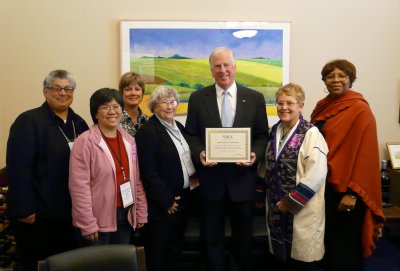
WASHINGTON – On April 30, Congressman Mike Thompson was recognized by California advocates from the National Breast Cancer Coalition for his perfect record of support.
During a meeting in his Capitol Hill office, the National Breast Cancer Coalition advocates, including two women from the First Congressional District, presented him with a certificate of excellence.
“Each year, tens of thousands of American women die from breast cancer,” said Thompson. “As we work toward a cure, we must do everything we can to promote early detection and invest in effective treatments. I am proud to be recognized by the National Breast Cancer Coalition, and look forward to continuing our partnership in the fight against breast cancer.”
In addition to consistently supporting breast cancer prevention and detection legislation, he is the author of the Medicare Early Detection of Cancer Promotion Act, which will waive co-pays for colonoscopy and mammography services.
“The vast majority of cancer diagnoses and deaths happen to older Americans, so we should make it as easy as possible for seniors to get regular cancer screenings,” said Thompson.
Sixty percent of new cancer diagnoses and 70 percent of cancer deaths occur in people over 65. “Co-pays for these services create a barrier to care,” added Thompson. “If we eliminate the co-pays, more seniors will get screened, saving lives and money.”
Currently, beneficiaries pay no coinsurance for most cancer screening services covered by Medicare, but they must pay a 20 percent co-pay for colonoscopy and mammography services. This legislation will eliminate co-pays for mammograms and colonoscopies, prompting more seniors to utilize these live-saving services.
Thompson’s legislation also extends the eligibility period for the “Welcome to Medicare” visit from the current time frame of six months to one year.
{mos_sb_discuss:3}